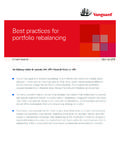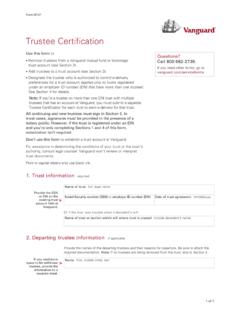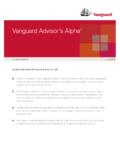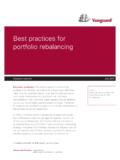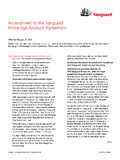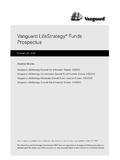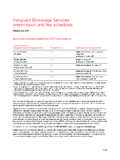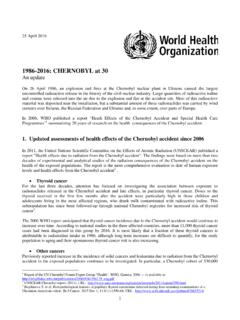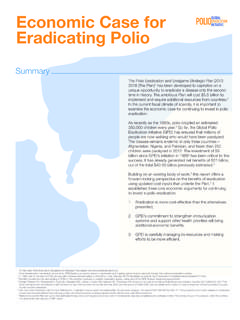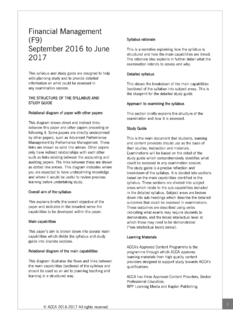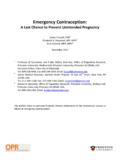Transcription of Putting a value on your value: Quantifying Vanguard ...
1 The value proposition of advice is changing. The nature of what investors expect from advisors is changing. And fortunately, the resources available to advisors are evolving as well. In creating the Vanguard Advisor s Alpha concept in 2001, we outlined how advisors could add value , or alpha, through relationship-oriented services such as providing cogent wealth management via financial planning, discipline, and guidance, rather than by trying to outperform the market. Since then, our work in support of the concept has continued. This paper takes the Advisor s Alpha framework further by attempting to quantify the benefits that advisors can add relative to others who are not using such strategies. Each of these can be used individually or in combination, depending on the strategy. We believe implementing the Vanguard Advisor s Alpha framework can add about 3% in net returns for your clients and also allow you to differentiate your skills and practice.
2 Like any approximation, the actual amount of value added may vary significantly, depending on clients M. Kinniry Jr., CFA, Colleen M. Jaconetti, CPA, CFP , Michael A. DiJoseph, CFA, Yan Zilbering, and Donald G. Bennyhoff, CFAThe buck stops here: Vanguard money market fundsVanguard research September 2016 Putting a value on your value : Quantifying Vanguard Advisor s Alpha 1 One basis point equals 1/100 of a percentage value proposition for advisors has always been easier to describe than to define. In a sense, that is how it should be, as value is a subjective assessment and necessarily varies from individual to individual. However, some aspects of investment advice lend themselves to an objective quantification of their potential added value , albeit with a meaningful degree of conditionality. At best, we can only estimate the value -add of each tool, because each is affected by the unique client and market environments to which it is applied.
3 As the financial advice industry continues to gravitate toward fee-based advice, there is a great temptation to define an advisor s value -add as an annualized number. Again, this may seem appropriate, as fees deducted annually for the advisory relationship could be justified by the annual value -add. However, although some of the strategies we describe here could be expected to yield an annual benefit such as reducing expected investment costs or taxes the most significant opportunities to add value do not present themselves consistently, but intermittently over the years, and often during periods of either market duress or euphoria. These opportunities can pique an investor s fear or greed, tempting him or her to abandon a well-thought-out investment plan. In such circumstances, the advisor may have the opportunity to add tens of percentage points of value -add, rather than mere basis points,1 and may more than offset years of advisory fees.
4 And while the value of this wealth creation is certainly real, the difference in your clients performance if they stay invested according to your plan, as opposed to abandoning it, does not show up on any client statement. An infinite number of alternate histories might have happened had we made different decisions; yet, we only measure and/or monitor the implemented decision and outcome, even though the other histories were real alternatives. For instance, most client statements don t keep track of the benefits of talking your clients into staying the course in the midst of a bear market or convincing them to rebalance when it doesn t feel like the right thing to do at the time. We don t measure and show these other outcomes, but their value and impact on clients wealth creation is very real, nonetheless. The quantifications in this paper compare the projected results of a portfolio that is managed using well-known and accepted best practices for wealth management with those that are not.
5 Obviously, the way assets are actually managed versus how they could have been managed will introduce significant variance in the is seeingWhat makes one car with four doors and wheels worth $300,000 and another $30,000? Although we might all have an answer, that answer likely differs from person to person. Vanguard Advisor s Alpha is similarly difficult to define consistently. For some investors without the time, willingness, or ability to confidently handle their financial matters, working with an advisor may be a matter of peace of mind: They may simply prefer to spend their time doing something anything else. Maybe they feel overwhelmed by product proliferation in the fund industry, where even the number of choices for the new product on the block ETFs exceeds 1,000. While virtually impossible to quantify, in this context the value of an advisor is very real to clients, and this aspect of an advisor s value proposition, and our efforts here to measure it, should not be negatively affected by the inability to objectively quantify it.
6 By virtue of the fact that the overwhelming majority of mutual fund assets are advised, investors have already indicated that they strongly value professional investment advice. We don t need to see oxygen to feel its who prepare their own tax returns have probably wondered whether an expert like a CPA might do a better job. Are you really saving money by doing your own tax return, or might a CPA save you from paying more tax than necessary? Would you not use a CPA just because he or she couldn t tell you in advance how much you would save in taxes? If you believe an expert can add value , you see value , even if the value can t be well quantified in advance. The same reasoning applies to other household services that we pay for such as painting, house cleaning, or landscaping; these can be considered negative carry services, in that we expect to recoup the fees we pay largely through emotional, rather than financial, means.
7 You may well be able to wield a paint brush, but you might want to spend your limited free time doing something else. Or, maybe like many of us, you suspect that a professional painter will do a better job. value is in the eye of the is understandable that advisors would want a less abstract or less subjective basis for their value proposition. Investment performance thus seems the obvious, quantifiable value -add to focus on. For advisors who promise better returns, the question is: Better returns than what? Better returns than those of a benchmark or the market ? Not likely, as evidenced by the historical track record of active fund managers, who tend to have experience and resources well in excess of those of most advisors, yet have regularly failed to consistently outperform versus benchmarks in pursuit of excess returns (see Philips et al., 2015). Better returns than those provided by an advisor or investor who doesn t use the value -added practices described here?
8 Probably, as we discuss in the sections following. Indeed, investors have already hinted at their thoughts on the value of market-beating returns: Over the ten years ended 2013, cash flows into mutual funds have heavily favored broad-based index funds and ETFs, rather than higher-cost actively managed funds (Kinniry, Bennyhoff, and Zilbering, 2013). In essence, investors have chosen investments that are generally structured to match their benchmark s return, less management fees. In other words, investors seem to feel there is great value in investing in funds whose expected returns trail, rather than outperform, their benchmarks returns. Why would they do this? Ironically, their approach is sensible, even if better performance is the overall goal. Better performance compared to what? Better than the average mutual fund investor in comparable investment strategies. Although index funds should not be expected to beat their benchmark, over the long term they can be expected to better the return of the average mutual fund investor in their benchmark category, because of their lower average cost (Philips et al.)
9 , 2015). A similar logic can be applied to the value of advice: Paying a fee for advice and guidance to a professional who uses the tools and tactics described here can add meaningful value compared to the average investor experience, currently advised or not. We are in no way suggesting that every advisor charging any fee can add value , but merely that advisors can add value if they understand how they can best help investors. Similarly, we cannot hope to define here every avenue for adding value . For example, charitable-giving strategies, key-person insurance, or business-continuation planning can all add tremendous value given the right circumstances, but they certainly do not accurately reflect the typical investor experience. The framework for advice that we describe in this paper can serve as the foundation upon which an Advisor s Alpha can be constructed. 3 Important: The projections or other information generated by the Vanguard Capital Markets Model regarding the likelihood of various investment outcomes are hypothetical in nature, do not reflect actual investment results, and are not guarantees of future results.
10 VCMM results will vary with each use and over time. These hypothetical data do not respresent the returns on any particular investment. (See also Appendix 2.)Notes on risk and performance data: All investments, including a portfolio s current and future holdings, are subject to risk, including the possible loss of the money you invest. Past performance is no guarantee of future returns. The performance of an index is not an exact representation of any particular investment, as you cannot invest directly in an index. Diversification does not ensure a profit or protect against a loss in a declining market. There is no guarantee that any particular asset allocation or mix of funds will meet your investment objectives or provide you with a given level of income. Be aware that fluctuations in the financial markets and other factors may cause declines in the value of your account. Bond funds are subject to the risk that an issuer will fail to make payments on time, and that bond prices will decline because of rising interest rates or negative perceptions of an issuer s ability to make payments.

